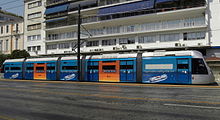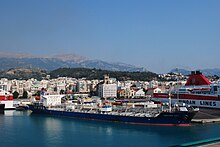| Economy of Greece |
|---|
 |
| Overview |
| History |
| Related |

Transport in Greece has undergone significant changes in the past two decades, vastly modernizing the country's infrastructure and transportation. Although ferry transport between islands remains the prominent method of transport between the nation's islands, improvements to the road infrastructure, rail, urban transport, and airports have all led to a vast improvement in transportation. These upgrades have played a key role in supporting Greece's economy, which in the past decade has come to rely heavily on the construction industry.


The state-owned company that owns and maintains Greece's railway network is OSE, Gaiose also a state-owned company owns and maintains railway stations, while Hellenic Train is the company responsible for operating all passenger trains and the most freight trains.

Cities with a rapid transit railway network:

Cities with a commuter rail network (Proastiakos):

Roads:

KTEL is the common name for every company which is responsible for intercity and regional bus transit. Most of the regional units, though, have their own regional network of buses, and have their regional unit names labeled on KTEL vehicles that operate there. (e.g. KTEL Argolidas).
There are 4 major bus terminals in Greece, the biggest is in Thessaloniki (Macedonia Inter city bus terminal) which serves all of Greece while Athens has 2 separate bus terminals serving different parts of Greece (Kifissos bus terminal and Liossion bus terminal). A new Athens bus terminal in Elaionas will replace the two separate terminals and serve all of Greece with completion by 2026. A new bus terminal in Patras which will replace the old one is currently under construction in Agios Dionyssios just 200m from the current one and it will open in late 2024 after many delays due to COVID-19 pandemic and the 2022 Russian invasion of Ukraine.

The 80 km system consists of three coastal canals including the Corinth Canal (6 km) and three unconnected rivers.
The Corinth Canal crosses the Isthmus of Corinth, connecting the Gulf of Corinth with the Saronic Gulf; and shortens the sea voyage from the Adriatic to Athens port of Piraeus by 325 km.

Pireaus Port Rafina Port Lavrion Port
| Sovereign states |
|
|---|---|
| States with limited recognition |
|
| Dependencies and other entities | |
| Other entities | |